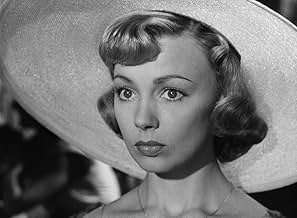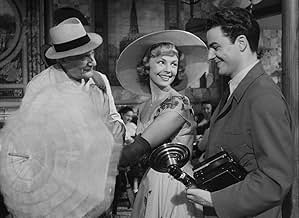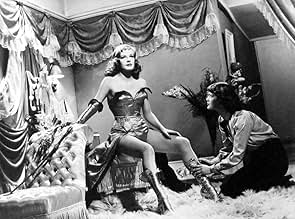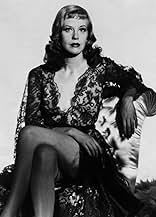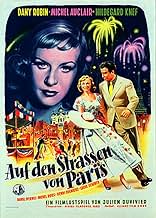Aggiungi una trama nella tua linguaAfter the rejection of their latest--preposterous--scenario, two scriptwriters get back to basics to prepare a new movie. The new scenario centers on Henriette, a pretty, lively Parisian, an... Leggi tuttoAfter the rejection of their latest--preposterous--scenario, two scriptwriters get back to basics to prepare a new movie. The new scenario centers on Henriette, a pretty, lively Parisian, and how she spends the 14th of July in Paris with her fiancé. We follow the tribulations of ... Leggi tuttoAfter the rejection of their latest--preposterous--scenario, two scriptwriters get back to basics to prepare a new movie. The new scenario centers on Henriette, a pretty, lively Parisian, and how she spends the 14th of July in Paris with her fiancé. We follow the tribulations of Henriette as various other characters enter the story and turn a traditional festive day i... Leggi tutto
- Regia
- Sceneggiatura
- Star
- Rita Solar
- (as Hildegarde Neff)
- Un scénariste
- (as Louis Seigner de la Comédie Française)
- …
- Un faux déménageur
- (as J.L. Le Goff)
- Dédé
- (as J. Clarieux)
Recensioni in evidenza
What this synopsis doesn't say is that this movie has a very unconventional narrative structure. It unfolds, develops, rolls back on itself and starts again according to the whims, arguments and opinions of the two on-screen screenwriters, their wisecracking female typist and their two girlfriends, while they go about everyday activities like going to the barber or fixing dinner. One of the scriptwriters (Henri Crémieux) fancies himself an anarchist and revolutionary (long before the New Wave) while the other (Louis Seigner) is more of a practical-minded classicist. The first one is always insisting on improbable and melodramatic turns of event, murders or suicides, while the other wants to keep things light, realistic and entertaining. All through the film, scenes and characters are introduced, analyzed and disposed of, resurrected or simply erased from the record. The result is one of those unknown masterpieces of French cinema that will probably stay unknown in America until the Criterion Collection takes a fancy to it.
This film boasts magnificent set pieces, female nudity, sexual situations, witty dialogue, unbelievably risky photography and stunts. Its editing also makes "Citizen Kane" look a student film. But it is most of all revolutionary in its narrative structure. It has been remade twice, as "Paris when it sizzles" (1964) and "À l'attaque" (2000). Even if the first of these remakes was a relative failure, it was also the first mainstream American comedy to call into question the narrative clichés and conventions of Hollywood film-making. The film is taking liberties with the space-time continuum in ways that would inspire numerous films as diverse as "Zazie dans le metro", "Adaptation", "Run, Lola. Run", "Amélie", the later comedies of Sacha Guitry and even the relatively few lighthearted moments of Truffaut's "Shoot the Piano Player".
To this day, anyone who knows about this film which gives cinematic story-telling the unlimited potential of a radio play - is sill in awe of its wonders.
I have a question for anyone who has seen this film or only heard about it: "Even though it would seem the most natural thing to do, in movies, for a director to play with the space and time structure of his story, can you think of any example previous to 1952 where an on-screen scriptwriter intervenes to change the run of the story?"
The only examples that come to my mind are both by Preston Sturges. There is a short sequence in "Sullivan's Travels" where Joel McCrea, as a director, toys around with the story of a film he wants to make called "Brother, Where Art Thou"; and another one in "Unfaithfully Yours" where the conductor-hero plans a murder in his mind that doesn't quite turn out as expected in reality. But even these examples don't involve the re-writing of the film's storyline as it goes along My question also eliminates any time-travel-type science-fiction film as well as films that straddle the borderline between dreams and reality like René Clair's "Belles de nuit" (1952).
First. I was always (since its release) very fond of "Le Magnifique" (1973), almost the only Belmondo one I love (I wrote/detailed the French Wikipedia article). It's the story of a writer (Belmondo) who writes a spy/thriller book, who meets a beautiful student lady (Bisset), who encounters problems with his publisher and who, finally, mixes all these elements in his book. It means we movies goers can watch two stories with the very same actors, in the real world and in the book. Without any doubt (imho), "Le Magnifique" is one of the ten best French comedies ever.
I was indeed very in love with the idea of throwing the reality in the fiction. Of course I knew it was not the first time some Mise en Abyme was put in a film but it was obviously the first time with a writer avenging his poor real life in his books.
Second. Then, recently, TCM Europe showed a lot of Audrey Hepburn movies I never saw. Among them was "Paris - When It Sizzles" (1964), with William Holden. Right after a few minutes I knew for sure where the idea of "Le Magnifique" came from! Holden plays a screenwriter who is very late in delivering his next opus and Hepburn is sent to him in Paris by the Hollywood producer to speed up the writing. Besides the predictable love story, the film divides itself in two parts, their reality and the fiction they're writing together and Hepburn (150% fabulous as always) and Holden play the four characters. The movie is real fun end very entertaining and very intelligently conceived.
Third. Knowing a new gem like this "Paris", I read on the net (en.wikipedia for instance) everything I could about it, whoa, just to learn it was an adaptation of a French movie, "La fête à Henriette" (1952). By chance, there was some discussion about it on an IMDb board and, as wrote user Benoît A. Racine in his comment, "A pen pal from the IMDb was good enough to send me a VHS copy of this French classic unavailable in America." I got a DVD instead he he and, as well, the film is not watchable in Europe. Many thanks again to "him" for his help and his sending to me the Duvivier one.
I finally watched it and noticed all converging points between "Paris" and "Henriette". Let's say "Henriette" is much more conceptual and less entertaining than "Paris", more of a game with the spectator and less of a logical story form A to Z (it's not its goal anyhow). Clearly the biggest difference with "Paris" and "Le Magnifique" is the fact that the actors of the reality (the writers of a script and their numerous secretaries) do not play in the fiction. The main point according to me is really: more conceptual.
Besides, it's pretty fun to see some actors (Auclair, Seigner, Roux) quite young in "Henriette" because they were known at that time and later more as second range stars: their true career came later, in the movies or on the stage. Robin was an important star in the 40s and 50s.
If you want to learn more: Reading over here all comments by reliable IMDb users rastar-1, dbdumonteil, writers_reign and Benoît A. Racine will bring you everything relevant you need about the movie: the plot, the style, the inventive director, the great actors, etc.
Finally, I have to confess I have not seen a lot of Duvivier's movies: I know very well "Marianne de ma jeunesse", which is a very special story, plenty out of time, deeply concerned with poetry and fantasy; I know as well the two "Don Camillo" he made with Fernandel; "La Femme et le panting" with Bardot from a book by Louÿs I read; "La Belle équipe" with Gabin... and it seems to be all. To bad because only "Marianne" and "Henriette" show he is a very important director in history, much more than most of the Nouvelle vague ones, and who was a visionary. Very worth to see, both the movie and any other film by him. "Henriette", a must see!
I won't get into a discussion of Duvivier's place in cinematic history, nor whether we needed the New Wave or not, nor even the use of film-within-a-film. I will just say that this is a very inventive and charming little comedy that really should be on DVD. There is a tremendous virtuosic sequence about 60 minutes in--Marcel tries to rape Henriette in a car, she escapes and he chases her up the stairs in a building under construction--that must be seen to be appreciated.
The fifties, between the great age of European film in the twenties and early thirties and the renewal of its traditions with the "new wave" movements of the sixties, was in some respects the time when US and European film traditions were at their most compatible. Since the advent of the talkies, compounded by the disaster of the war, US film-style might be said to have been triumphant, less so in Italy (neo-realismo and commedia all'Italiana) but distinctly so in Germany (whose cinema industry had been ruined by Hitler) and France (what the "new wave" would sneeeringly call "the cinéma de papa").
Yet, even at this low tide of European film, the comparison between these two films provides a useful gauge of the huge gulf that still divided European film (at its best) from the programmed mediocrity of Hollywood.
Quine's US film simply does not begin to comprehend the concept behind Duvivier's film. French wit is replaced by a distasteful vulgarity (just as the elegant score by Georges Auric is replaced by the muzack of Nelson Riddle). William Holden was at something of a lowpoint in his career but Audrey Hepburn (who had made Breakfast at Tiffany's in 1961 and Charade in 1963 and would appear in My Fair Lady this same year) would have seemed an ideal casting. Noel Coward does a very camp comic turn and there is an array of stars (Curtis, Dietrich, Sinatra) playing cameos. But nothing can redeem the film.
The French film offers a multi-layered experience where different levels of "reality" are juxtaposed - the entertaining frame-story of the two scenarists, the provisional (and ultimately rejected) ideas for the film to be written (all in practice suggested by one scenarist), shown sharply angled on the screen and what may be the final film (all in practice the work of the other scenarist). From the censorship that has ruled out the original film (that scene with the bishop and the young girl) to the various sensational suggestions made my scenarist A to the final script as devised by scenarist B, there is satirical comedy on every level and some interesting insights into the way a film scenario is constructed. The elements of parody work well (with an excellent recurrent gag about problems of disposing of bodies). There is immense charm in every moment of the film.
What is more, the frame story remains the frame it should be and the film within the film is actually written, which symbolically receives its credits (missing at the beginning) at the end.
The US film is a falsely sentimental story about a middle-aged drunk using the writing of a scenario as a pretext for seducing a young secretary and her not very strenuous attempts to resist. The incidental "satire" (of avant-garde film-making, of "method" acting) is sour and hamfisted and the parody (westerns, horror, war films, musicals, crime) is crude and rudimentary. The film is as entirely charmless as a film with two such charming stars could be.
The frame story (not much of a story) becomes effectively the film (another in the sequence of Hepburn's romances with older men) and the film within the film (a very truncated version of the original filled out with typical sixties kitsch) becomes of little interest.
It is almost exactly as though the US director has watched the French film and deliberately decided to reject everything in it of value.... 1964 was not a good time for US film (but nor was 1952 for French film) but whereas Duvivier was still able to produce a fine intelligent film, Quine's effort merely emphasises how difficult the hidebound US industry was finding it in the sixties to review its practice in the light of new ideas or to compete with the revolution by then occurring in the European film industry.
Lo sapevi?
- QuizFrench censorship visa # 13195.
- Citazioni
Un scénariste: What if we simply told a love story?
Un scénariste: Between two women?
Un scénariste: Between two women?
Un scénariste: What? Between two men?
Un scénariste: Idiot!
Un scénariste: Between who and who then?
- ConnessioniReferenced in Kedamono no iru machi (1958)
I più visti
Dettagli
- Tempo di esecuzione
- 1h 58min(118 min)
- Colore
- Mix di suoni
- Proporzioni
- 1.37 : 1

